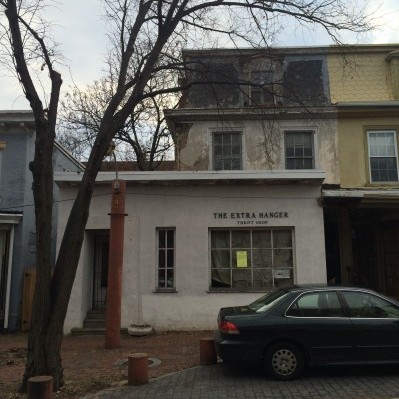Inside Take: How City Hall Makes Blight Worse

One arm of city government plans to make a Germantown street look like this, while another…
(This is an opinion column from a Citified insider.)
This could prove to be a seminal year in Philadelphia’s seemingly intractable fight against blight. The launch of the long-awaited Land Bank and stepped up efforts by agencies like the Department of Licenses & Inspections and the Philadelphia Redevelopment Authority are encouraging developments. And yet, with an almost Jekyll & Hyde approach, one major obstacle still stands in the way of progress – city government.
Let’s step back and recall a few persistent truths about development in Philadelphia. Construction costs are high, land is expensive and property values – particularly in neighborhoods where blight and vacancy persist – remain depressed. Moreover, many blighted, vacant properties are saddled with layers of liens – tax delinquency, nuisance violations, unpaid utility bills, etc. – which make those lots far less attractive to developers.
While the land bank is designed to ultimately address properties like this, it will likely be some time before we really have a sense of how efficiently and aggressively the Land Bank is able to reposition these eyesores for redevelopment. In the meantime, we have a solution at our disposal that is one of the most powerful tools Pennsylvania communities have ever had to combat blight – it’s called Act 135, the Abandoned and Blighted Property Conservatorship Act.
In short, Act 135 gives communities a court supervised tool to reclaim blighted properties that code enforcement and community consternation have been unable to fix. But there’s a catch. The law requires that once the property is placed in conservatorship, rehabilitated and sold, government lien holders get the first cut of the proceeds. This is where some elements of city government are obstructing blight fighting, by being unwilling to engage in any discussion about reducing or waiving existing liens on vacant properties – even if that makes the redevelopment of that property impossible.
Here is a real-life example: 30 Maplewood Mall, in Germantown, a blight poster-child. The city has cleaned and sealed off the openings. The roof appears damaged, and it has been vacant for years. It also stands in the middle of a block that the city Commerce Department plans to invest several million dollars in as part of a transformative streetscape improvement project. One would think the city would do everything in its power to maximize the impact of that investment and ensure the rehabilitation of this property. But the city’s law department is unwilling to have a discussion about the nearly $16,000 in liens and judgments against this property.

…has policies that make it impossible for communities to rehabilitate blighted properties like this one on the same street.
Here’s why that matters.
When completely rehabilitated, the property would probably be worth no more than $150,000 (just a function of the depressed market it sits in). It will likely take well over $100,000 in hard construction costs to fix up the building. That doesn’t include any soft construction costs such as architecture and engineering, permit fees, legal feels, the developer’s time and of course transaction costs on the backend sale – transfer tax, recording charges, broker’s fee, etc. So long as the City remains adamant that it will not reduce the outstanding liens, any developer who dared take that property on through conservatorship would actually lose money on the project. Last time I checked, that’s not the best incentive to encourage redevelopment.
The City’s position has been that the school district’s financial crisis is paramount and every dollar of delinquency that can be collected should be pursued. There is no arguing with the need to bring in additional funds for the school district – that should be our city’s number one priority. But the best fiscal policy for the district (and the rest of City government) would actually be to put properties like this back into productive use. It would generate transfer tax when the property was sold, it would regenerate continuing property tax payments, it would enhance the property values of the neighboring properties, it would house a new family or new business would contribute to the city’s wage tax base, so on and so forth.
Moreover, the City’s position relies on one critical assumption – that these liens are actually collectible. The honest truth about most of the city’s nearly $500 million in delinquent property tax is that it is simply impossible to collect. Delinquent owners are often hard if not impossible to find. Even if the property is moved to tax sale and the city’s is able to get some or all of the delinquency repaid, it doesn’t guarantee that the property will be redeveloped. It could continue to sit and deteriorate, contributing to City government’s own estimated $20 million annual cost of tending to vacant, blighted properties. Conservatorship, on the other hand, would place a developer under court order to rehabilitate the property within a certain timeframe.
So here are a couple of suggestions for the current administration to consider for its remaining tenure and the flock of Mayoral candidates to hopefully chew on over the next five months (and the seven months after the primary):
- City leadership should determine whether blight elimination and neighborhood stabilization are true priorities – if so, every department that plays a role in that goal should act in concert;
- If stabilizing the City and School District’s tax base is the real goal, city government needs to take a slightly longer view and realize that everyone wins when properties are rehabilitated, new residents move in and new businesses start-up creating local jobs – the short-term gain of a few dollars via tax sale cannot overcome the long-term value redevelopment can have on our city;
- Work with community groups and developers who seek to utilize Act 135 to leverage the intended impact of the Land Bank and facilitate its use so that we utilize every tool in our arsenal to really take this problem head-on.
If we take a comprehensive approach to blight elimination, and the city government departments work in lock-step towards that goal, 2015 may truly be the year that Philadelphia turns the tide on this long-standing problem.
Anuj Gupta is Executive Director of Mt. Airy USA – a non-profit community development corporation that revitalizes sections of northwest Philadelphia through real estate development, small business development and promotion, housing counseling and foreclosure prevention, and strengthening neighborhood public schools. Prior to this position, Anuj served as Chief of Staff of the Department of Licenses & Inspections and a deputy to the Managing Director in Mayor Nutter’s first term.